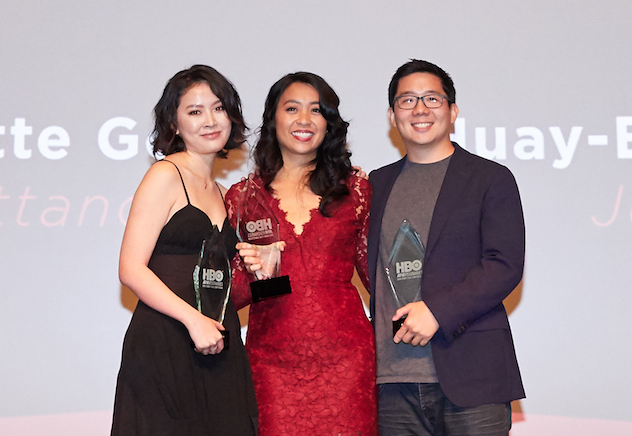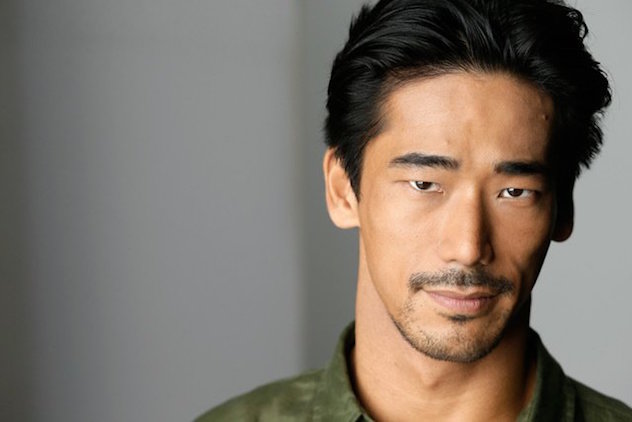A child’s voice on a cell phone, the space between two doors, sharing a tub of bubbles with a sister — that’s what home means for the winners of HBO’s APA Visionaries Short Film Competition this year. Maritte Go’s “Remittance,” Huay-Bing Law’s “June” and Fiona Roan’s “Jiejie” premiered at the Directors Guild of America in Hollywood during Los Angeles Asian Pacific American Film Festival on May 4.
“Westworld” star Leonardo Nam returned this year as the competition’s ambassador. Nam expressed his enthusiasm for the competition’s mission of empowering and championing diverse storytellers by giving them a platform to share their work. “To be part of a network that really elevates our work feels like a winning moment,” Nam said. “This competition is showing the world that [Asian Pacific Americans] have stories to tell and we craft them well and that they resonate with a larger audience.”
First-place winner Huay-Bing Law’s “June” takes place in the 1950s and follows a young Taiwanese couple at an American dinner party. Although the evening starts off enjoyable, a trip to the bathroom gives June a different perspective on race and identity in America.
Roan’s “Jiejie” is an autobiographical piece about two young Chinese sisters who move to Oregon with their mother. As the elder sister struggles to fit in with the other children, her younger sister does not make the transition any easier.
Go’s “Remittance” tells the story of a Filipino woman who must endure the loneliness of working aboard a cruise ship in order to send money back to her mother and son in the Philippines.
Here’s what the winners had to say about the inspiration behind their winning films and future projects.
Huay-Bing Law – “June”

Huay-Bing Law’s “June” (Courtesy photo)
The theme is “What does home mean to you?” How did that evolve into “June” as it ended up being?
“June” is really kind of an immigrant story. The time at which this story takes place, it’s about this woman’s first day in America. So, I think these characters [are] kind of homeless, in-between homes. Between Taiwan and America. They’re hoping to make America their home, but at this moment they’re not sure where they belong.
Why the 1950s? Is there any particular reason you chose that period?
[I chose] the 1950s was because it was based on a family story. There was this key moment in the middle of the film where they come across these segregated restrooms. [June’s] not sure which one to use, the colored one or the whites-only one. That era’s when the Jim Crow laws were still in existence.
How do you see your film as being in conversation with the rest of Hollywood and Asian representation today?
I’m really, really crossing my fingers, and I’m really hoping that there’s this big wave coming of Asian American stories. With “Crazy Rich Asians” coming out, everyone’s excitement is building. Hopefully, with all three filmmakers and these three stories and HBO, this is the beginning of that wave. It’s been 25 years since “Joy Luck Club,” so hopefully this is just the beginning and it will inspire people to tell their stories.
What other projects do you want to pursue next?
I work as a cinematographer as well. I’m shooting a feature in Vietnam later this summer. It’s about this 20-year-old man who goes back to his family to attend his father’s death ceremony and he brings his boyfriend with him but he hasn’t come out yet. So, there’s family drama that happens.
Fiona Roan – “Jiejie”

Fiona Roan’s “JieJie” (Courtesy photo)
How did you develop the idea for this film?
It’s a biographical film. Everything that happened basically really happened. It was based on my experience immigrating to Oregon with my mom and sister.
How important do you think themes of fitting into American society are for younger Asian Americans?
I think it’s very important. We see a lot of immigrant stories, but they’re rarely told from children’s perspectives. Especially from a young girl’s perspective. For a young girl, it means the world to look like everyone else. I think that’s a very emotional thing. In my film, I wanted to explore the difference between first- and second-generation Asian Americans, which is something so subtle that we overlook. We actually are very different. I think that’s what’s so interesting about this Asian Pacific community.
A lot of this is about your own personal experience. Why did you feel that you needed to open up about your own experiences to a bigger audience?
This was my thesis film. We were encouraged to tell our personal stories. I needed to make a story that was meaningful to other people as well and to make other people feel like they’re part of this. I’m telling their story as well. As I was writing it, I interviewed my family and other families. The response I got was, “We’ve experienced that too,” and that really gave me the confidence to go down that route.
Maritte Go – “Remittance”

Maritte Go’s “Remittance” (Courtesy photo)
A lot of different Filipino American filmmakers are talking about the importance of having a lot more Filipino films and TV shows. How important is that to you?
That’s the most important thing to me. Before I went to USC for film school, I was an actress. I kept getting cast as the geisha or Nail Technician #2, and I was never put into a lead role. I always had to have a Chinese accent or a Japanese accent, and I was sick of it. I decided to stop acting and went to film school so I could create roles for people exactly like us, who are Filipino American. Right now, I’m writing features that are set to shoot with a Filipino American lead in mind, and that just means everything to me.
Can you speak to the platforms that are available to you as an emerging filmmaker? When you have these projects that you want to do, what are the spaces you’re looking at when you want to reach an audience?
With the feature that I’m working on right now, putting it out there has been quite difficult because [executives] have been [saying] “You know, we need a white male to sell this movie.” I pitched my feature to many companies, and it was the same thing. I understand that it’s a business, and people want to do what’s been proven. But the lead female in my script, she takes precedence. It’s her story. [A white man] can be there and if it works with the story and if that’s what it takes to get a Filipino American in a leading role, then so be it. But right now, with movies like “Black Panther,” you’re seeing people break down barriers by making all this money. The same thing can happen for Asian Americans.
How did you develop the idea for “Remittance” and what would you like to communicate to your audience?
I’ve been going back and forth [to the Philippines] for the last couple years. My cousins out there, my uncles, my aunts and my mom, they’ve all been doing the same thing, which is remittance. They have to move far away from their families, make money and send it over. My cousin Roy had to move to Dubai, and he works in resorts. He sends all his money back home to his wife and his children to support them, to let them go to school. After seeing HBO put out [the theme] “What does home mean to you?” I started thinking about that. What does home mean to my cousin Roy? Did my mom feel that way when she moved to the United States? Being separated from her family, how does that feel? I wanted to convey that story in this short.





